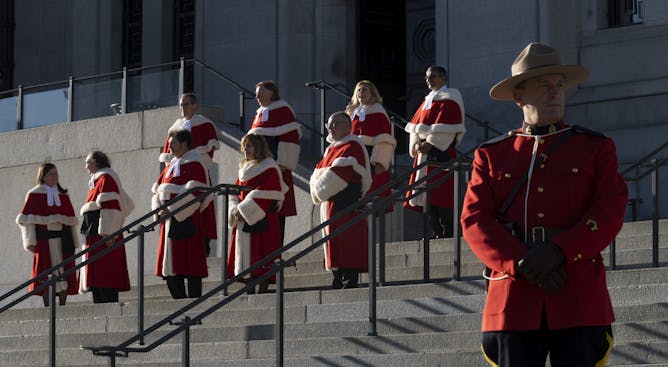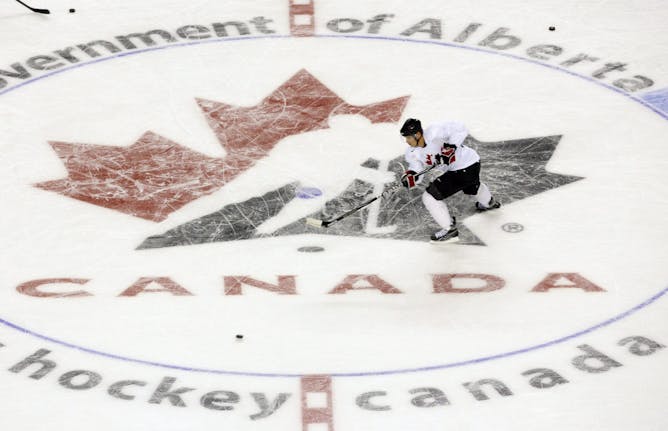|
|
|
|
Like other institutions across the western world, universities are involved in a time of reckoning about colonialism and racial justice. In Canada, part of this process involves decisions that touch on rethinking symbols or mascots, reconsidering how resources are allocated and revisiting what knowledge matters.
Today in The Conversation Canada, Caitlin Harvey of the University of Cambridge writes about how “an emphasis on campus iconography, or even on the campus itself, skirts a deeper history of universities and empire.”
Her research examines how “most public universities founded in the 19th century — especially in what is now Canada, the United States and Aotearoa New Zealand, but also in South Africa and Australia — were large-scale landowners.”
These lands were divided into plots and parcels distant from the universities themselves. She explains how using land rents to fund universities followed a longstanding pattern established by the universities of Oxford and Cambridge.
The pattern of university landholding, she writes, “deserves further exploration — not only for what it might reveal about universities, but for its potential as a window into the operation of empire, colonialism and Indigenous dispossession.”
Also today:
|

|
Susannah Schmidt
Education + Arts Editor
|
|

People gather as a totem pole is raised at the University of British Columbia in Vancouver, B.C., in April 2017.
THE CANADIAN PRESS/Darryl Dyck
Caitlin Harvey, University of Cambridge
In the 19th century, British colonial practices of using land to fund universities was a fragmented, but far-reaching, pattern of institutional development.
|

The severe heat wave in western Canada and the U.S. Pacific Northwest, between June and July 2021 caused 1,400 deaths.
(Shutterstock)
Alex Boston, Simon Fraser University
North America’s 2021 extreme heat event should compel governments to scale innovations from leading cities and countries to advance resilient, restorative and renewable cities.
|

Service provider apps are set up in ways that endanger gig workers.
(Shutterstock)
Ning Ma, University of British Columbia; Dongwook Yoon, University of British Columbia
Rating services on ride and task apps disadvantage gig workers, whose future work assignments are affected by their ratings. Women workers are made vulnerable, and have to contend with harassment.
|

Supreme Court of Canada Chief Justice Richard Wagner waits to pose for a group photo with other members of the Supreme Court on the steps of the building following a welcoming ceremony for Judge Mahmud Jamal in October 2021 in Ottawa.
THE CANADIAN PRESS/Adrian Wyld
David Said, University of Guelph
Decision-making in the Canadian Supreme Court appears to be more fundamentally rooted in the law, not politics, than it is in the United States. Here’s why.
|

People have come forward in highly publicized stories speaking to experiences of sexism, sexual violence and silencing at the hands of hockey players and teams.
THE CANADIAN PRESS/Jeff McIntosh
Shannon D. M. Moore, University of Manitoba; Teresa Anne Fowler, Concordia University of Edmonton; Tim Skuce, Brandon University
We need to question how gender is understood, constructed and performed by hockey players, teams, coaches and organizations to truly change the culture.
|
La Conversation Canada
|

Peter Thiel, cofondateur de PayPal et de Palantir, prononce un discours important lors de la conférence sur le Bitcoin, en avril dernier, à Miami Beach en Floride.
(AP Photo/Rebecca Blackwell)
Annie Lecompte, Université du Québec à Montréal (UQAM)
L’engouement envers les cryptomonnaies ne cesse d’augmenter. Or, le milieu est risqué pour les investisseurs, non seulement au niveau de la volatilité, mais également au niveau des fraudes.
|
Ukraine Invasion
|
-
Basil Germond, Lancaster University
Beyond a symbolic win, reclaiming Snake Island has strategic repercussions, from the opening of a safe corridor to the diplomatic confrontation between Moscow and the west.
-
Greg Dolgopolov, UNSW Sydney
Set in Ukraine in 2014, Solntsepyok’s propaganda is designed to confuse, entertain and overwhelm the audience.
|
|
Business + Economy
|
-
Keith Laybourn, University of Huddersfield
Strikes are happening across various UK industries at the moment, but what is the history of strike action in UK?
|
|
Culture + Society
|
-
Sanya Osha, University of Cape Town
All that remains of the political icon is a tooth, but it represents much more than just a human trophy.
|
|
Science + Tech
|
-
David Tuffley, Griffith University
TikTok has admitted its Chinese employees have access to user data collected outside China.
|
|
|
|
| |
| |
| |
| |
|
|
|
|
|
|
|